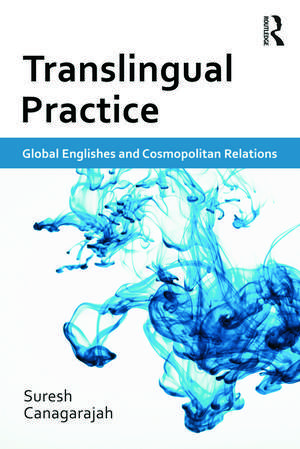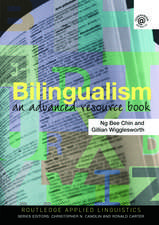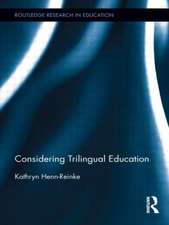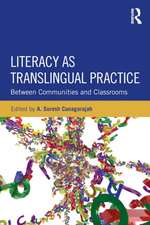Translingual Practice: Global Englishes and Cosmopolitan Relations
Autor Suresh Canagarajahen Limba Engleză Paperback – 30 noi 2012
Winner of the Modern Language Association's Thirty-Third Mina P. Shaughnessy Prize
Winner of the BAAL Book Prize 2014
Translingual Practice: Global Englishes and Cosmopolitan Relations introduces a new way of looking at the use of English within a global context. Challenging traditional approaches in second language acquisition and English language teaching, this book incorporates recent advances in multilingual studies, sociolinguistics, and new literacy studies to articulate a new perspective on this area. Canagarajah argues that multilinguals merge their own languages and values into English, which opens up various negotiation strategies that help them decode other unique varieties of English and construct new norms.
Incisive and groundbreaking, this will be essential reading for anyone interested in multilingualism, world Englishes and intercultural communication.
Preț: 391.50 lei
Nou
Puncte Express: 587
Preț estimativ în valută:
74.92€ • 77.93$ • 61.85£
74.92€ • 77.93$ • 61.85£
Carte tipărită la comandă
Livrare economică 15-29 aprilie
Preluare comenzi: 021 569.72.76
Specificații
ISBN-13: 9780415684002
ISBN-10: 0415684005
Pagini: 224
Dimensiuni: 156 x 234 x 13 mm
Greutate: 0.34 kg
Ediția:New.
Editura: Taylor & Francis
Colecția Routledge
Locul publicării:Oxford, United Kingdom
ISBN-10: 0415684005
Pagini: 224
Dimensiuni: 156 x 234 x 13 mm
Greutate: 0.34 kg
Ediția:New.
Editura: Taylor & Francis
Colecția Routledge
Locul publicării:Oxford, United Kingdom
Public țintă
Postgraduate and UndergraduateCuprins
1. Introduction 2. Theorizing Translingual Practice 3. Recovering Translingual Practices 4. English as Translingual 5. Translingual Negotiation Strategies 6. Pluralizing Academic Writing 7. Negotiating Translingual Literacy 8. Reconfiguring Translocal Spaces 9. Developing Performative Competence 10. Toward a Dialogical Cosmopolitanism Notes References
Recenzii
Canagarajah has done it again. Just when you may have thought it was safe to retreat to the confines of disciplinary discipline and conceptual conformity, he produces a work that necessitates a serious re-examination and re-appraisal of what language study is, or should be, about. This masterful book will be essential reading for anyone seeking answers to the question: How do we do linguistics in a globalised world?
Alan Firth, Newcastle University, UK
This is a timely and illuminating study of language use in global contact zones. In a highly innovative approach, the author goes beyond simply arguing that educators need to enable students to produce translingual texts that represent their voice but actually shows how this can be done. His book is an important contribution to the ongoing shift in sociolinguistics from a monolingual to a translingual orientation to language and communication.
Jean-Jacques Weber, University of Luxembourg
'Canagarajah has done it again. Just when you may have thought it was safe to retreat to the confines of disciplinary discipline and conceptual conformity, he produces a work that necessitates a serious re-examination and re-appraisal of what language study is, or should be, about. This masterful book will be essential reading for anyone seeking answers to the question: How do we do linguistics in a globalised world?' - Alan Firth, Newcastle University, UK
'This is a timely and illuminating study of language use in global contact zones. In a highly innovative approach, the author goes beyond simply arguing that educators need to enable students to produce translingual texts that represent their voice but actually shows how this can be done. His book is an important contribution to the ongoing shift in sociolinguistics from a monolingual to a translingual orientation to language and communication.' - Jean-Jacques Weber, University of Luxembourg
'Overall, the author has succeeded in delivering what he promises. That is, both in conversation and academic writing, there is room for multilinguals to engage in translingual practice, mixing their diverse linguistic and cultural resources in their language use to negotiate new norms of acceptance. These are valuable insights, as they invite us to consider the possibility of multilinguals acting as agents of linguistic change, instead of being trapped in a deficiency label of being a non-native.' - Shizhou Yang, Yunnan Minzu University, China; Purdue University, US
'For practitioners and teacher educators, the notion of translingual practice can help them reflect on their students’ practices, the contextual/power relationships that always affect educational settings, and the processes of language learning/teaching. This book is likely to generate further debates concerning the status and uses of English today, especially in relation to language ideologies, and encourage researchers and practitioners to view language use and language contact from a different perspective.' - Fan (Gabriel) Fang, English Language Centre, Shantou University, China
Alan Firth, Newcastle University, UK
This is a timely and illuminating study of language use in global contact zones. In a highly innovative approach, the author goes beyond simply arguing that educators need to enable students to produce translingual texts that represent their voice but actually shows how this can be done. His book is an important contribution to the ongoing shift in sociolinguistics from a monolingual to a translingual orientation to language and communication.
Jean-Jacques Weber, University of Luxembourg
'Canagarajah has done it again. Just when you may have thought it was safe to retreat to the confines of disciplinary discipline and conceptual conformity, he produces a work that necessitates a serious re-examination and re-appraisal of what language study is, or should be, about. This masterful book will be essential reading for anyone seeking answers to the question: How do we do linguistics in a globalised world?' - Alan Firth, Newcastle University, UK
'This is a timely and illuminating study of language use in global contact zones. In a highly innovative approach, the author goes beyond simply arguing that educators need to enable students to produce translingual texts that represent their voice but actually shows how this can be done. His book is an important contribution to the ongoing shift in sociolinguistics from a monolingual to a translingual orientation to language and communication.' - Jean-Jacques Weber, University of Luxembourg
'Overall, the author has succeeded in delivering what he promises. That is, both in conversation and academic writing, there is room for multilinguals to engage in translingual practice, mixing their diverse linguistic and cultural resources in their language use to negotiate new norms of acceptance. These are valuable insights, as they invite us to consider the possibility of multilinguals acting as agents of linguistic change, instead of being trapped in a deficiency label of being a non-native.' - Shizhou Yang, Yunnan Minzu University, China; Purdue University, US
'For practitioners and teacher educators, the notion of translingual practice can help them reflect on their students’ practices, the contextual/power relationships that always affect educational settings, and the processes of language learning/teaching. This book is likely to generate further debates concerning the status and uses of English today, especially in relation to language ideologies, and encourage researchers and practitioners to view language use and language contact from a different perspective.' - Fan (Gabriel) Fang, English Language Centre, Shantou University, China
Descriere
Translingual Practice: Global Englishes and Cosmopolitan Relations introduces a new way of looking at the use of English within a global context. Challenging the traditional approaches in second language acquisition and English language teaching that treat the norms of native speakers as the target model for learning and emulation, this book incorporates recent advances in SLA, multilingual studies, and lingua franca English to take a new look at this area.














